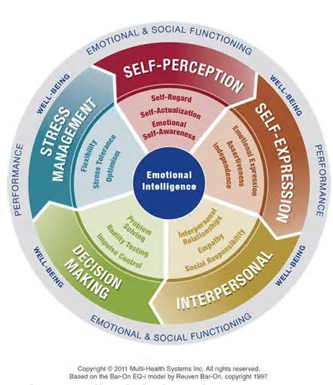My firm, Anderson & Anderson, APC is an experienced provider of psychotherapy, anger management and emotional intelligence for adolescents and adults. We recently began receiving referrals from substance abuse agencies in Los Angeles to provide individual coaching for emotional intelligence skill enhancement in impulse control.
It is often the clients who request this additional service. While anger management/impulse control has long been a part of substance abuse treatment. Emotional intelligence as an intervention is not widely used in substance abuse treatment.
Persons With Addictive Disorders Often Score Low in Emotional Intelligence
Giving up an addiction is an important first step, but it is not usually enough to ensure future success in impulse control, empathy, social awareness or relationship management. This is because there will usually be a reason for why the person fell into substance abuse in the first place and that reason is likely to be still there. One of the most common motives for turning to alcohol or drugs is poor skills in emotional self-awareness and the inability to deal with emotions in general. This occurs because the individual lacks or have deficits in emotional intelligence.
Emotional Intelligence Defined
Emotional intelligence can be defined as the ability of the individual to assess and control the emotions of themselves and others. This type of intelligence can be measured using assessments such as the EQ-i-2.0 Assessment. Emotional intelligence is not static. It is possible for anyone interested in improving his or her emotional intelligence to profit from coaching or classes designed for skill enhancement in emotional intelligence.
Below is a list of the 15 scales that are measured by the above instrument:
- Self-Regard
- Self-Actualization
- Emotional Self-Awareness
- Emotional Expression
- Assertiveness
- Independence
- Interpersonal Relationships
- Empathy
- Social Responsibility
- Problem Solving
- Reality Testing
- Impulse Control
- Flexibility
- Stress Tolerance
- Optimism
Incorporating Emotional Intelligence into Alcohol and Other Drug Prevention
According to Daniel Goleman, five dimensions of Emotional Intelligence are: self-awareness, self-regulation, motivation, empathy and social skill.
The dimension of self-awareness provides an individual with the ability to recognize and understand one’s own moods, emotions, and drives as well as their effect on others. An individual high in self-awareness is more likely to be attuned to their family values, to be able to speak clearly, accurately and more objective about their emotions and the impact they have on academic performance, family life and social support which ultimately assist in dealing with substance abuse problems.
Self-aware adolescents and adults are comfortable talking about their limitations and strengths in these regards and exude a high degree of self confidence when making decisions about family issues, peer pressure and drug use since they are highly aware of the condition and capabilities for improvement and are less likely to set themselves up for failure.
The dimension of self-regulation provides the person with the ability to control or redirect disruptive impulses and moods or the propensity to suspend judgment in order to think before acting. Adolescents and adults high in self regulation are better able to create an environment of trust, integrity, and fairness with themselves, the people around them, their family, and newly found social support groups that help regulate AOD abuse thereby reduces miscommunication and increases productivity in the relationship.
Association with drug using peers, poor impulse control and early and persistent problematic behaviors have been shown to predict substance abuse in adolescents and adults. Also, self- regulation provides the adolescent and other adults with constructive skills to dynamically change approaches to better serve their growing personal needs and to learn to be open to making changes in life with limited drug use, or methadone maintenance treatment.
The dimension of motivation provides the person with a passion to work for more than materialistic reasons and to work for the propensity to pursue goals with energy and persistence. Motivation provides the best environment for adolescents and other adults to reduce or cease use of drugs or share problems to family and support groups even in the face of numerous challenges.
The dimension of empathy provides the adolescent and adult with the ability to understand the emotional makeup of others and provides the skills in treating others around them according to their emotional reaction. Since individuals with a high level of empathy are more likely to be compassionate when dealing with others in their life that might provoke them to be angry or aggressive.
The dimension of social skills provide the individual with the ability to manage effective relationship patterns and behaviors and build networks with the ability to find common ground and build rapport with family, friends and peer groups.
Each of these dimensions give meaning to EI and provide the foundational groundwork in the process of defining EI. More importantly, the five dimensions afford us the means to objectively use EI as a measure of adolescent and adult ability to actively cope and deal with substance abuse and to be able to use this information to improve health outcomes.
These five skills along with the other 10 mentioned above should be the focus of coaching or small group classes in which participants have an opportunity to practice these skills in real life situations in order to achieve mastery in intra and interpersonal relationships.
Following the EI skill enhancement coaching, the same EI assessment is administered again and can be used to determine the level of success or lack of success for each client.
In summary, while equestrian therapy, yoga and mindfulness have been added to many substance programs, there appears to be a reluctance to incorporate emotional intelligence as a strategy for enhancing skills that are directly related to interpersonal relationships and impulse control.
George Anderson, the Anger Management Guru




